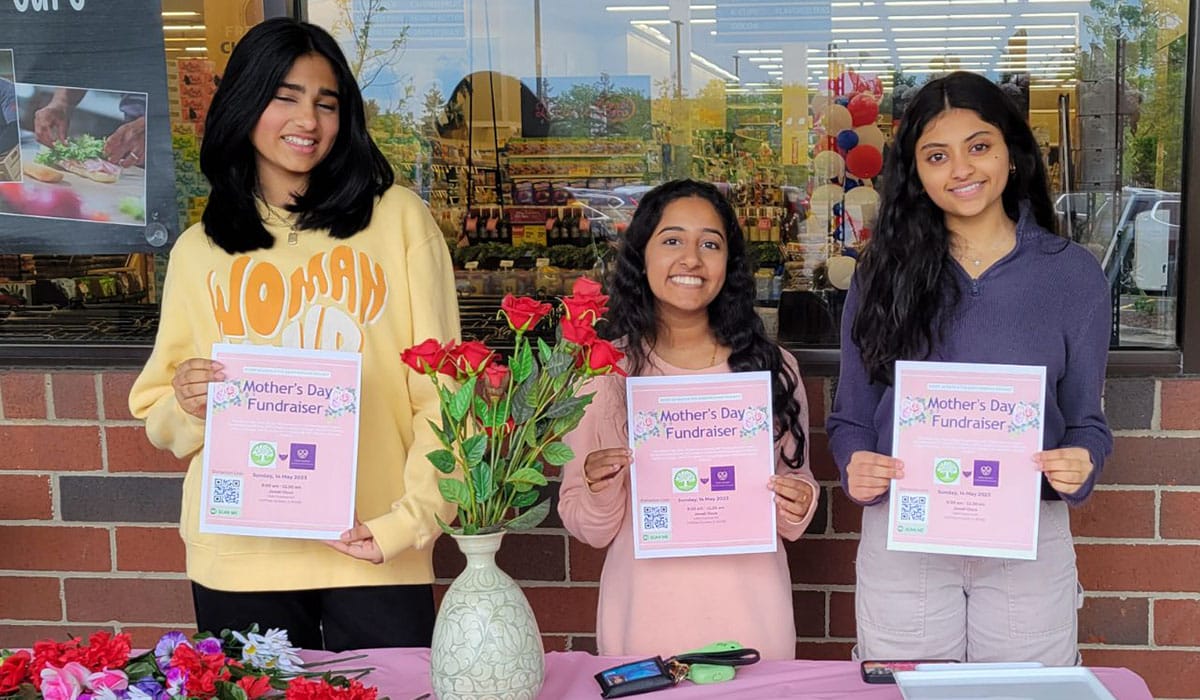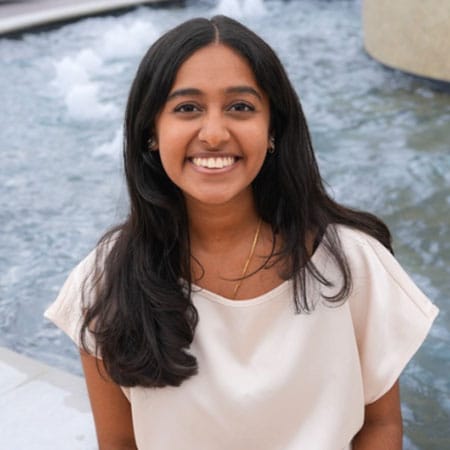WORKING TO MAKE PERIOD POVERTY A THING OF THE PAST

Meet Daily Point of Light Award honoree Amrutha Venkat. Read her story, and nominate an outstanding volunteer or family as a Daily Point of Light.
Amrutha Venkat is working to erase stigma around bodily functions. Growing up in an Indian culture where menstruation was treated with silence, Amrutha was a bit perplexed by the customs she faced. If she had her period, she couldn’t attend temple or eat off the same plates as her family. After going away to college and meeting her roommates, she determined that it wasn’t her Indian or religious background that motivated these customs, but the traditions of the caste system. Seeking to shed the stigma of menstruation, Amrutha wanted to help individuals facing period poverty by distributing menstrual hygiene products and promoting menstrual health education.
In March of 2023, Amrutha cofounded Every 28 Days, a Chicago-based organization that strives to donate 500 million sanitary pads to underserved populations. Amrutha has raised $30,000 toward providing essential hygiene products for marginalized populations, including LGBTQ+ communities. The organization has distributed more than 40,000 menstrual products across underserved communities in multiple U.S. states, becoming a force in addressing menstrual health disparities, particularly for underrepresented communities. The team has also had a tremendous impact across the globe, raising funds for a donation to Nyaka Global, which provided menstrual hygiene products to girls at a school in Uganda. No matter their location, the Every 28 Days team is fighting to alleviate the stigma of menstruation.
Amrutha’s work with Every 28 Days has also served as a catalyst for her future life path. Currently a busy college student studying public health, she volunteers 20 to 30 hours per month with Every 28 Days. She’s planning on attending medical school, where she’ll continue to focus on helping others from a public health perspective. Amrutha’s dedication to smashing stigma and eliminating period poverty is a powerful testament to the impact volunteerism can have. Not only did she inspire positive change within her community, but she also discovered the path that would pave the way toward her bright future.
What inspired you to get started with this initiative?
I was raised in a culture where menstruation was regarded in silence and shame. I come from an Indian background, and growing up, I followed caste traditions. I was told not to enter the kitchen or that I couldn’t go to the temple while on my period. I couldn’t be around or touch my male family members. I have a brother and a father. If I had my period, then I had to eat off different plates. It was just tradition. It was just how my parents grew up. Those were always just rules that I followed and never really thought about. I never really thought much about it. I just thought that that’s how it worked for everybody. I didn’t know until coming to college, where I met my roommates, that it wasn’t an Indian thing or a religious thing, but it was more from caste traditions. I didn’t realize until college that it was a stigma, and that is what began this whole initiative.

Tell us about your volunteer role with Every 28 Days.
I co-founded Every 28 Days to address period poverty and dismantle menstrual stigma that still exists. We partner with organizations to donate products locally and globally. We do a lot of educational campaigns. We’ve spoken at storefront fundraisers, libraries and pride festivals. We do fundraising and advocating for transgender youth. It’s a lot of fundraising and advocacy events and speaking out locally. Now we have five other chapters in Virginia, Georgia, Colorado, Texas and New Zealand. These chapters are also run by girls like our age, so it’s really cool to see that impact nationally.
What are your long-term plans or goals for the organization?
In the long run, the goal is to donate 500 million pads. But also, we’re working on an educational menstrual health game with a coding organization for young girls. The idea of that is to destigmatize menstrual health at a young age. We also want to continue expanding our chapters and deepening the global partnerships that we already have. This is in the very long run, but we want to develop some type of low-cost, reusable pad for rural areas and underserved communities.
What’s been the most rewarding part of your work?
The impact of being able to see the difference that we’re making from these organizations like Nyaka Global, where we were able to see the young girls holding the pads that we had provided for them. We partnered with Wings, which is the local domestic violence shelter. They had sent us a picture of the boxes that we had sent to their shelter. The fact that this is going to women who are in need, and we can use our privilege to make an impact, was cool. It still fascinates me that we’re able to do this, even though our whole team is so young.
What have you learned through your experiences as a volunteer?
I’ve learned that you don’t have to be a certain age or at a certain point in your life to make a difference. I started this when I was freshly 18. My co-founder was 16 when we started. We’re both young, and it’s been more than two years, but we’ve been able to raise so much money and make a difference.
Why is it important for others to get involved with causes they care about?
Even if it’s volunteering two hours of your time, not only is it helpful for the populations that you’re serving, but it also brings a sense of peace to you. Doing public health work and this work with Every 28 Days drives me to the work that I want to go into. It gives me a lot to talk about for med schools, because I feel like I’ve experienced so much, and not all necessarily related to the field that I’m going into. If you have that sense of purpose, I feel like that can fuel so much more in your life.
Any advice for people who want to start volunteering?
Don’t wait to be ready. Impacting one person can make a difference. It can be easy to overthink it, but even donating one hour of your time can make a difference. Also, be open to feedback and take that constructive criticism to grow.
What do you want people to learn from your story?
You have to start small. When we started this, I was 18 and had just come to college. I go to school in Florida, so going from Chicago to Florida already felt like a huge thing. At our first fundraiser, we got $25. We wondered what we could change to make it better. At the second fundraiser, we got $500. It was just making small changes and seeing what we could do better, taking constructive feedback and growing it into this movement we never expected. What people can learn is to just plant the seed. You don’t have to know where it’s going to go, but just start small and see what happens.
Do you want to make a difference in your community like Amrutha? Find local volunteer opportunities.